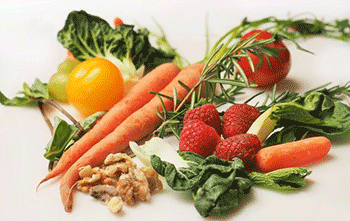Are you eating the foods that are best for your eyes? There's more to eye nutrition than just carrots. Learn which foods boost your eye health and help protect against sight-threatening diseases.
Estimates suggest that 21 million Americans have some sort of functional vision problem or eye condition, and vision loss is among the top 10 disabilities in adults in the U.S.
While some problems are more serious and not preventable, there are things that can be done to promote good, general eye health, and eating well is one of them. Studies have suggested that getting a high dose of nutrients like lutein, Omega 3 fatty acids and lycopene can help lower your risk of developing macular degeneration by up to 25 percent. And experts say the potential benefits don't stop there.
 Here are the best foods for promoting eye health.
Here are the best foods for promoting eye health.
Kale, Spinach And Collards
Spinach, kale and collard greens, to name a few, are full of lutein and zeaxanthin, plant pigments that can help stem the development of macular degeneration and cataracts. Broccoli, peas and avocados are also good sources of this powerful antioxidant duo.
Turkey
Turkey is also rich in zinc (plus the B-vitamin niacin, which specifically protects against cataracts). What’s more, turkey is incredibly versatile and a terrific lean substitute for high-fat beef.
Turkey is a great sandwich stuffer, it’s delicious in a salad, and you can easily use lean ground turkey for burgers, chili and tacos.
Corn
Another great source of lutein and zeaxanthin, corn should always be served cooked and with a source of dietary fat to increase absorption of these eye-healthy nutrients. Pop a corn on the cob on the barbeque on a summer’s evening, warm up in the winter with a bowl of creamy corn chowder or add it to a fiery vegetable chilli.
Sweet Potatoes
Bright orange fruits and vegetables get their colour from beta carotene, a precursor of vitamin A, that helps promote healthy vision.
In fact, a one-cup serving of sweet potato has more than the full daily requirement for vitamin A. And yes, there is another orange, vitamin A-rich option that's more commonly associated with protecting our peepers.
Eggs
One of the healthiest ways to start your day, protein-packed eggs are also provide nutrients such as lutein, vitamin E, and omega 3s, in addition to other nutrients and vitamins. Certain eggs are even better for you: Eggland’s Best eggs, for example, have 38 percent more lutein than regular eggs, 10 times the amount of vitamin E, and more than double the omega-3s in regular eggs.
Citrus Fruits and Berries
All berries – from blueberries to strawberries – are powerhouses of Vitamin C, which of course reduce the risk of developing macular degeneration and cataracts. Of all the berries, blackcurrants contain some of the highest levels of the antioxidant anthocyanins found in nature, with bilberries also boasting impressive amounts. Red colored berries also contain beta-carotene – another fantastic eye-friendly nutrient.
There is no limit to what you can do with in-season fresh berries – from milkshakes or juices to jams and fruit salads. Out of season, you could always supplement with some black currant seed oil or bilberry extract.
Fish
Cold-water fish such as salmon, tuna, sardines and mackerel are rich in omega-3 fatty acids, which may help protect against dry eyes, macular degeneration and even cataracts.
If you don't eat seafood, you can get a good supply of omega-3s by using fish oil supplements or taking vegetarian supplements that contain black currant seed oil or flaxseed oil.
Seeds, Nuts, and Wheat Germ
Vitamins C and E work together to keep healthy tissue strong. But most of us don't get as much vitamin E as we should from food. Have a small handful of sunflower seeds, or use a tablespoon of wheat germ oil in your salad dressing for a big boost. Almonds, pecans, and vegetable oils are also good sources.
Beef
In moderation, lean beef in your diet can boost your eye health. Beef contains zinc, which helps your body absorb vitamin A and may play a role in reducing risk of advanced age-related macular degeneration.
Avoiding Eating This for Healthy Eyes…
Healthy vision is just as much a result of what you don’t eat as what you do. For starters, high insulin levels from excess carbohydrates can disturb the delicate choreography that normally coordinates eyeball lengthening and lens growth. And if the eyeball grows too long, the lens can no longer flatten itself enough to focus a sharp image on the retina. This theory is also consistent with observations that you’re more likely to develop myopia if you are overweight or have adult-onset diabetes, both of which involve elevated insulin levels. You’ll want to avoid sugars, especially fructose, as much as possible.
High blood pressure can cause damage to the miniscule blood vessels on your retina, obstructing free blood flow. A diet high in trans fat also appears to contribute to macular degeneration by interfering with omega-3 fats in your body. Trans fat is found in many processed foods and baked goods, including margarine, shortening, fried foods like French fries, fried chicken, doughnuts, cookies, pastries, and crackers.
Sources:
Make your appointment today
To make your appointment, simply give us a call (760)-948-3345 or
or
Due to COVID-19 safety protocols, all eyewear services are currently by appointment only. Please call to make an appointment.
At Golden Eye Optometry, we view good vision care as front line protection at every age. A routine eye exam can detect more than poor vision. It can shed early light on glaucoma, macular degeneration, cataracts and diabetes.